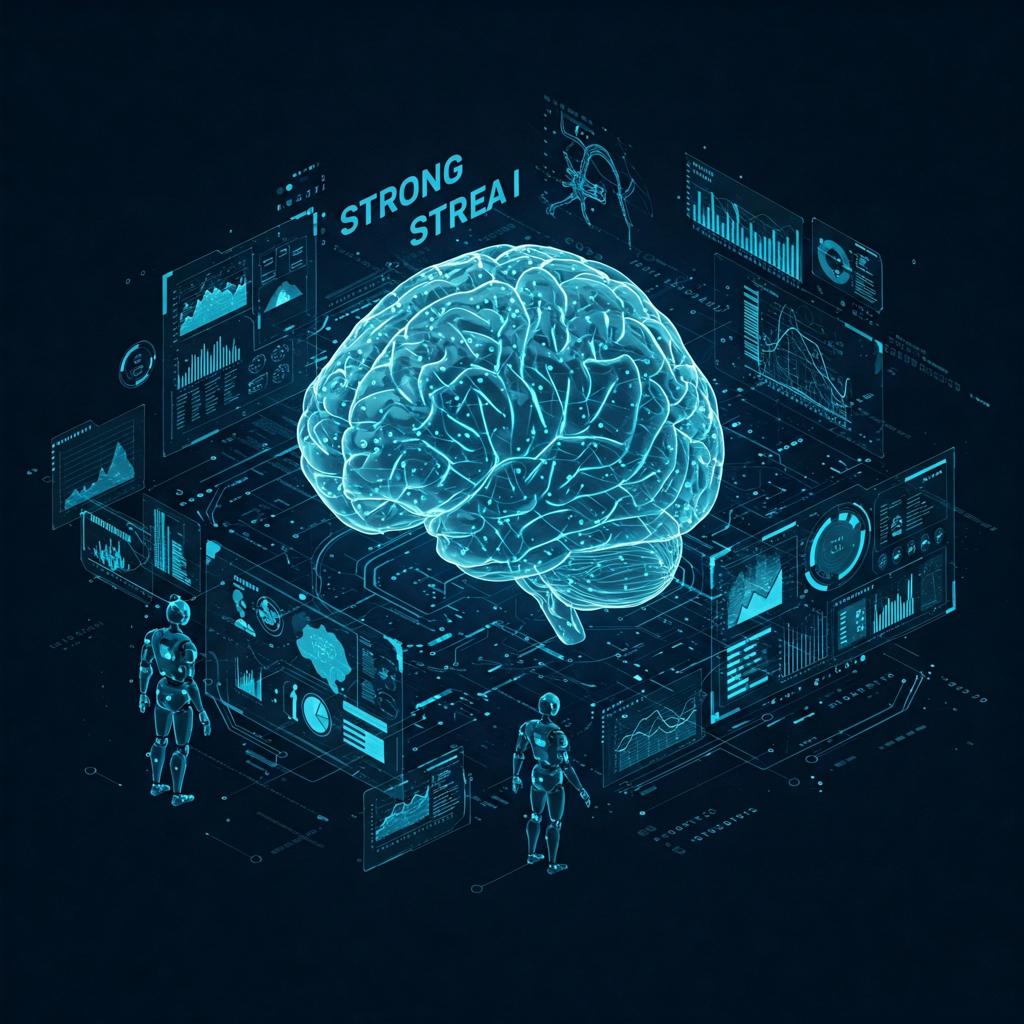
Strong AI: Exploring the Future of General AI
Strong AI, also known as General AI, is a concept within artificial intelligence that represents the ambition to create machines capable of performing any intellectual task that a human can.
Unlike Narrow AI, which excels at specific tasks like playing chess or recommending products, Strong AI aims to build machines that can learn, understand, and apply knowledge in a variety of contexts.
While still in its early stages, the development of Strong AI promises a future where machines could possess human-like reasoning abilities, autonomy, and even consciousness. This article delves deep into the nature of Strong AI, its theoretical applications, potential benefits, and the challenges that come with its development.
What Defines Strong AI (General AI)?
General AI, or Strong AI, is distinct from its counterpart Narrow AI because of its broad applicability and adaptability. While Narrow AI is engineered to excel at a particular task or set of tasks, Strong AI seeks to emulate the cognitive functions of the human brain, enabling machines to apply intelligence across a variety of domains. Strong AI does not rely on pre-programmed responses or narrowly defined data sets but instead seeks to develop a form of intelligence that is self-aware, adaptable, and capable of independent thought.
Key Characteristics of Strong AI
The concept of Strong AI brings several unique characteristics to the table. Here are the defining features that set it apart from other forms of AI:
Human-Like Intelligence: At its core, Strong AI aims to replicate human cognitive processes such as reasoning, understanding, problem-solving, and learning. It’s not restricted to a single task but rather has the ability to generalize knowledge across multiple domains.
Adaptability: Unlike Narrow AI, which is designed for specific tasks, General AI would have the ability to adapt to new situations without requiring retraining. This means a Strong AI system could shift from one task to another and retain its intelligence across various contexts.
Autonomous Decision-Making: General AI would possess the capability to make decisions independently, based on the information it has learned. It would not need to follow pre-programmed rules but would instead use logical reasoning and past experiences to come to conclusions on its own.
Self-Learning: A critical feature of Strong AI is its ability to learn autonomously. Just as humans learn from experience, Strong AI systems would be capable of improving themselves over time, making them more efficient and effective in their respective tasks.
Consciousness (Theoretical): Although still speculative, some theorists suggest that General AI might one day achieve a level of consciousness. The question of whether an artificial system can possess awareness, self-reflection, or emotions remains a subject of heated debate in the AI community.
Potential Applications of Strong AI
While Strong AI remains a theoretical concept, its potential applications could be groundbreaking. Below are some of the most exciting examples of how General AI might be utilized if it were to come to fruition:
1. Autonomous Robots
One of the most intriguing possibilities for Strong AI is in the development of autonomous robots. These robots could perform complex tasks in unpredictable environments, such as cleaning homes, working in hospitals, or even assisting in search-and-rescue missions. Unlike current robots that are programmed for specific functions, a General AI-equipped robot would have the ability to adapt to a wide range of tasks and environments without requiring manual reprogramming.
2. Self-Improving AI Systems
A General AI system could, in theory, optimize its own algorithms and expand its knowledge base autonomously. Such self-improvement would allow the system to solve problems in diverse domains—from healthcare and engineering to scientific research—without the need for constant human intervention. This self-improvement ability would make General AI a highly versatile and efficient tool in various industries.
3. AI with Emotional Intelligence
In addition to reasoning and problem-solving, General AI could potentially develop emotional intelligence. By recognizing and responding to human emotions, Strong AI systems could engage in meaningful social interactions, provide emotional support, and even serve in roles such as therapy or counseling. The ability to understand and respond to human emotions would mark a significant leap in human-computer interaction.
4. Advanced Virtual Assistants
General AI-powered virtual assistants could dramatically improve the way we interact with technology. These assistants would go beyond simple voice commands to engage in complex, context-aware conversations. For instance, they could manage multiple tasks across different platforms, predict future needs, and offer tailored recommendations based on an individual’s unique behavior patterns. The versatility of such assistants would extend to a range of industries, from personal use to enterprise-level applications.
Benefits of Strong AI
While General AI is still largely theoretical, its potential benefits are vast. If developed responsibly, Strong AI could bring about significant advancements in various fields, ranging from healthcare to education. Below are some of the primary advantages that General AI promises:
1. Efficiency and Automation
General AI has the potential to automate tasks across multiple industries, significantly improving efficiency. From scientific research to diagnostics, Strong AI could process vast amounts of data, uncover patterns, and make decisions faster and more accurately than humans. This would free up human workers to focus on more complex and creative tasks while leaving repetitive or data-intensive tasks to AI.
2. Problem-Solving Capabilities
With its human-like intelligence, Strong AI could solve problems that are currently beyond the reach of both humans and existing AI systems. For example, it could assist in complex scientific endeavors, from curing diseases to finding sustainable energy solutions, by processing data across multiple domains and developing innovative solutions.
3. Cross-Domain Knowledge
General AI would have the ability to combine knowledge from multiple fields, enabling it to solve problems that require interdisciplinary expertise. For example, it could apply insights from both biology and engineering to design more effective medical devices or help in environmental conservation efforts by integrating data from climate science and economics.
4. Enhanced Personalization
In industries like marketing and healthcare, General AI could analyze vast amounts of data to provide highly personalized recommendations and treatment plans. In marketing, it could tailor advertisements to individual preferences, while in healthcare, it could suggest personalized health regimens based on a person’s medical history, lifestyle, and genetic makeup.
Challenges of Developing Strong AI
The development of General AI is fraught with challenges, many of which are technical in nature, while others are ethical and philosophical. Below are some of the most significant hurdles that must be overcome:
1. Complexity of Human Cognition
Replicating human cognition is an extraordinarily complex task. Human intelligence is not just about logical reasoning but also involves emotions, intuition, and creativity—qualities that are difficult to model in machines. Achieving a true simulation of human-like intelligence requires overcoming immense technical and philosophical obstacles.
2. Ethical Concerns
As Strong AI continues to develop, ethical concerns surrounding its use will become more pronounced. Questions about AI autonomy, decision-making, and potential misuse for harmful purposes (e.g., in warfare or surveillance) need to be addressed. Moreover, the potential for job displacement and the societal impacts of widespread automation must be carefully considered.
3. Resource-Intensive
Developing General AI requires enormous computational power and vast datasets. The complexity of replicating human intelligence demands cutting-edge technology and infrastructure, making it an expensive and resource-intensive undertaking. Moreover, the need for continuous refinement of algorithms and models further increases the resource demands.
4. Uncertainty of Consciousness
One of the most debated aspects of General AI is whether machines can truly possess consciousness, emotions, or free will. While current AI systems can simulate certain aspects of human behavior, the question of whether an AI could ever truly "experience" or "understand" in the same way humans do remains speculative. Theories about machine consciousness continue to evolve, but this remains one of the most profound challenges in AI development.
The Road Ahead for Strong AI
The path toward creating General AI is still in its early stages, and many researchers believe it could take decades, if not longer, before we see fully realized systems of General AI. However, advancements in machine learning, neural networks, and computational power are steadily progressing, bringing us closer to this ambitious goal.
As we move forward, it will be essential for AI researchers, ethicists, and policymakers to work together to ensure that the development of General AI is done in a responsible and ethical manner. Ensuring that these systems benefit humanity, without causing harm or exacerbating inequality, will be one of the most important challenges of the coming decades.
In the future, as General AI evolves, it is hoped that it will not only transform industries but also our understanding of intelligence, consciousness, and what it means to be human. While we are far from achieving this technological milestone, the journey toward General AI represents one of the most exciting frontiers in the world of artificial intelligence.


